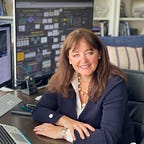Forever Young — EY’s origins & the role of accountancy & auditing in climate action
EY co-founder Arthur Young knew a thing or two about beginnings — how would he feel about the greater role accountancy & auditing are beginning to play in tackling climate change? I’d guess proud!
I love beginnings that lead to favourable outcomes, like the dawn of client projects I’m a key part of here at EY — projects that harness the power of emerging tech and drive innovation to help organisations remain competitive in today’s disruptive environment.
However, in this blog, I’d like to talk about perhaps a greater beginning that predates the inception of any fruitful EY work: the birth of EY itself. The idea came to me recently when I found a photo I took back in May 2019 at our office in Trivandrum, India, showing a black-and-white framed picture of Arthur Young’s 1953 Managers Meeting.
Who is Arthur Young?
Arthur Young was one of EY’s founding fathers. In 1906, the Scottish accountant set up Arthur Young & Co, one of the two firms merged in 1989 to form the firm’s current partnership — first called Ernst & Young before a 2013 rebrand. The other was Ernst & Whinney, established in 1979.
Arthur was born in Scotland in 1863 and later graduated — just like me — from the University of Glasgow, where he’d studied law and played rugby. He apprenticed with a law firm in “the Dear Green Place” before moving to the United States in 1890, beginning the practice of public accounting in NYC four years later and eventually going on to create Arthur Young & Co with his brother Stanley.
Arthur died in 1948, so he’s not actually in the above photo of his eponymously-named Managers Meeting. However, this was a man who certainly knew a thing or two about beginnings and outcomes. Finding the shot above got me thinking about not only EY’s origins and successes, but also how such a natural-born problem-solver might begin trying to fix some of society’s greatest problems.
I could spend days writing about the Scotsman’s conceivable solutions to all of today’s biggest issues, but seeing as we’re just off the back of COP26, let’s focus on the most obvious one: climate change. I can’t help but feel Arthur would be incredibly impressed with the 2021 United Nations Climate Change Conference, held in his hometown, especially considering his profession is beginning to play a more significant role in tackling climate change.
The role of accounting and auditing in climate action
Arthur Young was one of the earliest names in a profession established in the late 19th Century — a profession now uniquely placed to begin playing a bigger part in tackling the climate crisis. As we strive to curb global warming and hit carbon neutrality by 2050, to avoid a climate disaster, accountants and auditors can help in various ways.
Above everything else, these professionals are able to lean on their broad experience over the last century to assist organisations in gaining a stronger understanding of the effect their business activities have on the environment, leading to more environmentally-friendly business models. They can achieve this, for instance, by assisting leaders to set carbon reduction goals, keep track of and minimise carbon emissions, spend more on greener projects, and manage climate risk.
Accountants and auditors are in the business of numbers, and so they’re in a perfect position to do several things. The first is to quantify and record companies’ greenhouse gas emissions, allowing them to move beyond lip service and actually define realistic and meaningful reduction goals.
The second is to gather and analyse data on firms’ overall carbon footprints, meaning they’re able to target problem areas — this is made easier by the guidance given by the Global GHG Accounting and Reporting Standard for the Financial Industry.
And the third is to encourage spending on more environmentally and socially sustainable projects, which create carbon credits to offset organisations’ greenhouse gas emissions.
Moreover, the profession is responsible for ensuring any climate-related financial disclosures mandated by new draft regulations — designed to green the global financial system so that financial decisions are made with the climate in mind — remain consistent with existing TCFD’s rules.
Beyond all this, EY’s Ruchi Bhowmik suggests accountants and auditors have the opportunity to help with: achieving globally consistent metrics and disclosures that are reliable, comparable and relevant; providing independent assurance over climate reporting and disclosure for stakeholder confidence, and integrating the accounting and finance function to deliver value to all stakeholders.
At the end of the day, much of what’s needed here relates to the development of greater trust and transparency — accomplishable only by the crucial profession established by Arthur Young and his contemporaries. I truly hope he’d be proud to see that his work could literally begin saving the planet!
